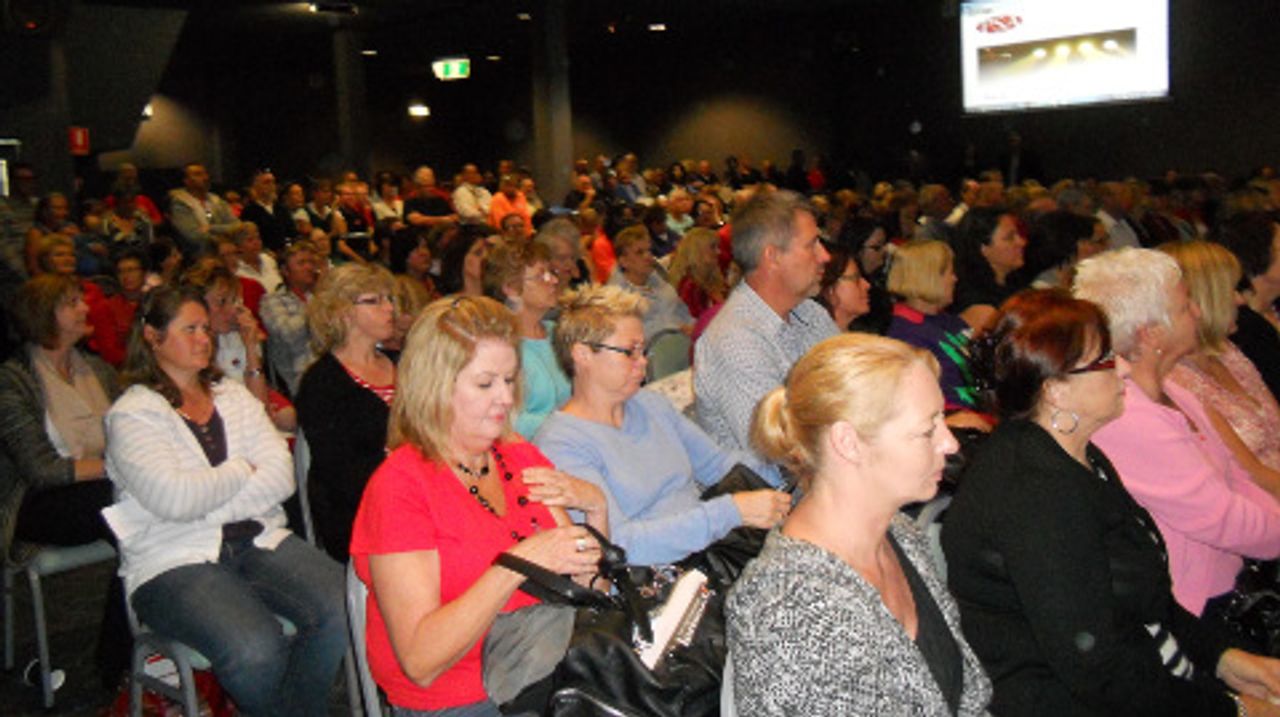More than 40,000 New South Wales (NSW) public sector workers stopped work on Monday in opposition to the sweeping attacks being carried out by the state Liberal-National government. These include the axing of up to 15,000 jobs, the slashing of working conditions and the elimination of essential social programs.
The state government has also lodged an application in the NSW Industrial Relations Commission (NSWIRC) to diminish or abolish a range of workers’ entitlements in the Crown Employees Conditions Award. Annual leave loading, sick leave entitlements as well as penalty rates and recreational leave entitlements for some shift workers have been targeted.
Reflecting the widespread outrage among public sector workers, the four-hour stoppages went ahead in defiance of a directive by the NSWIRC last Friday not to proceed with the industrial action. Some 15,000 workers packed venues across the state to hear reports broadcast via televised hook ups from the main Sydney meeting.
 Public sector workers rally in Sydney
Public sector workers rally in SydneyWhile workers came looking for a way to fight the assault on their jobs and conditions, the Public Sector Association (PSA) called the strike as part of a cynical union campaign to harness the anger and opposition behind the re-election of state and federal Labor governments.
The message was in line the basic theme spelled out by Prime Minister Julia Gillard just weeks ago at the Queensland state Labor conference. “The Liberals and Nationals always cut too much and they always cut the wrong things. They devastate families, damage businesses, hurt communities,” she told delegates. The implication was that Labor would continue to slash spending, but in a more humane fashion than the Coalition.
Union officials at yesterday’s PSA meetings attempted to maintain the same political fraud. They denounced NSW Premier Barry O’Farrell for imposing “ideologically driven” budget cutbacks in line with Liberal-National Party governments in Queensland, Victoria and Western Australia.
Australian Council of Trade Unions (ACTU) national secretary Ged Kearney set the scene by declaring that the axing of public sector jobs in NSW “must be seen as part of broader attacks by the Liberal National Coalition throughout Australia to attack the rights of decent working people”.
Unions NSW state secretary Mark Lennon and PSA officials followed suit. “Here in NSW we have seen through the O’Farrell government the expression of what a conservative agenda means, slashing rights, removing entitlements and of course ripping away workers’ compensation benefits,” Lennon said. He warned that if Liberal opposition leader Tony Abbott were elected as prime minister “he will simply follow the same slash-and-burn conservative agenda.”
However, there is not a shred of difference between the economic strategy of Labor and Liberal governments. Both parties are pursuing the austerity agenda being demanded by global finance capital around the world to make working people pay for the deepening crisis of international capitalism. The program being imposed by the Labor-led state governments in Tasmania and South Australia is just as socially regressive as the cutbacks in NSW. Since last year, more than 7,000 public sector jobs have been destroyed in those two states along with funding for essential social programs and services.
The union officials made no mention of the record of the NSW Labor government, which lost office last year in a landslide defeat after 16 years in office. Labor presided over the sharp deterioration of public hospitals, public transport and other social services, and was notorious for its cosy relations with major investment banks, property developers and speculators. Many voters were especially bitter about the Labor government’s decision to privatise electricity provision despite overwhelming public opposition.
The federal Labor government is not ranged “on one side of the struggle” opposing the cuts of “conservative” governments as portrayed by PSA state secretary John Cahill. Rather the Gillard government, which largely controls the purse strings, has set the austerity program to be pursued by the state governments, Labor and Coalition.
In this May’s federal budget, Labor pledged to eliminate the huge deficit of $44 billion by mid-2013 and to maintain surpluses in coming years. It imposed the biggest cuts to social spending in 25 years, the immediate axing of 3,000 public sector jobs, a 2.5 percent cap on public servant pay increases and deep inroads into social security entitlements.
The unions have no intention of defending jobs, working conditions and services at the state or federal level. The PSA’s “ongoing political and industrial campaign” outlined in the official resolution at yesterday’s meetings in NSW is simply designed to let off steam through limited protests while making futile appeals to the O’Farrell government to withdraw its cuts. The real purpose of the so-called campaign was revealed by Cahill who told workers to take the message of how the cuts will impact on jobs and services out to the public “especially marginal seats”.
The World Socialist Web Site spoke to a number of public sector workers at yesterday’s meetings in Sydney and Newcastle.
Vonnie, an emergency services employee, said that while front-line jobs in the service were not normally cut, “a lot of the work takes place behind the scenes in the administrative offices, and headquarters. When the administrative jobs go, the frontline workers have to do the work, somebody has to do it,” she said.
 A section of the Newcastle meeting
A section of the Newcastle meeting“There have been some positions cut and amalgamations over the last few years. It started under the Labor government. The other thing about cutting positions at the state level is that it will create federal costs, with unemployment. It’s shifting costs. It’s all about the bottom dollar, and budget cuts. What is the social cost going to be of returning budgets to surplus? We live in a society, not an economy.”
Michael Burnbridge is a disability nurse at the residential care centre in the Newcastle suburb of Stockton run by the Department of Aging Disability and Home Care that caters for 450 long-term residents with special needs, including mental health problems.
Michael said that previous cuts had already led to “severe understaffing” making it extremely difficult to provide adequate care for residents. He said that the centre has been under continuous threat of closure and restructure under both Labor and Liberal state governments. “The cuts by the previous Labor government are just being carried on by O’Farrell,” he said.
“Disability nurses are paid around 8 to 9 percent less than other public sector nurses. Low pay is affecting the staffing situation further because it does not attract trained staff and workers are constantly leaving looking for better paying positions. We have only pressed for moderate pay increases in the past. Despite this, our jobs are under threat.
Janine Cato, a school support officer with the Department of Education, said the elimination of support positions in schools would mean the most vulnerable pupils, those with disabilities “will be hurt”. Janine said without specialised attention the behaviour of such children would impact negatively on other pupils.
“As support workers we look after children with real needs and problems. We carry out many tasks such as personal care, hygiene, toileting or just sitting with children helping them with basic reading, writing and arithmetic. If our positions are cut then these tasks would have to be carried out by teachers who are already hard pressed and would not have the time.”
Janine said that cuts by the previous state Labor government “already mean that everyone has too much work to do and cannot fit it into a normal working day. Just when we think cuts can’t go any further, they do. There are three teachers’ support positions at my school. I think all of these will go in O’Farrell’s cuts.”
Janine added: “We are going the corporate way. O’Farrell promised before he came to office he would not cut jobs and conditions in the public service, but he is doing that anyway. If Labor got in, they could do the same.”
Subscribe to the IWA-RFC Newsletter
Get email updates on workers’ struggles and a global perspective from the International Workers Alliance of Rank-and-File Committees.
